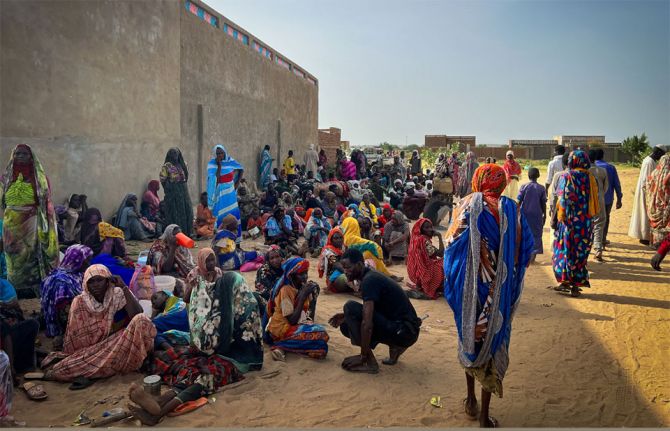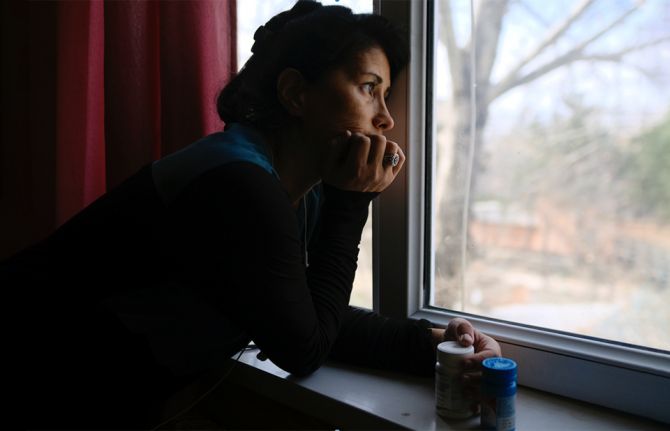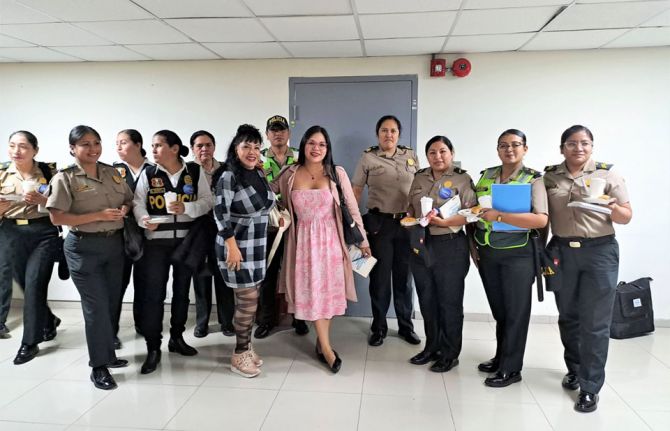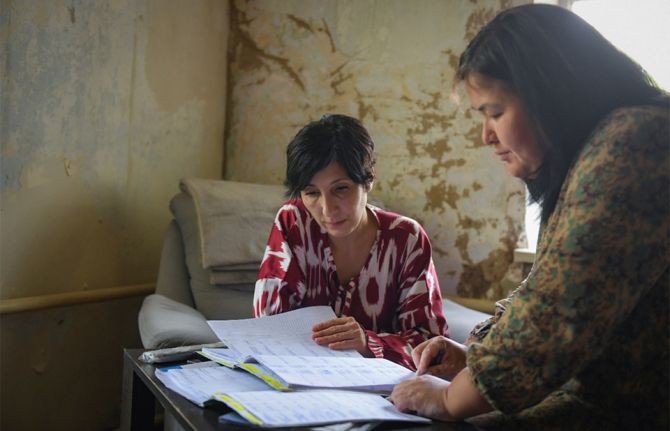
Feature Story
Gulf Cooperation Council Member States call for collaborative approach to effectively respond to AIDS
28 April 2011
28 April 2011 28 April 2011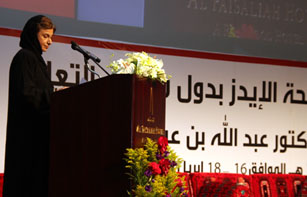
Mrs Hind Khatib Othman, Director of UNAIDS Regional Support Team for Middle East and North Africa participating in the Saudi initiative “Combating AIDS in GCC countries”. 16-18 April 2011. Riyadh, Kingdom of Saudi Arabia.
A new initiative “Combating AIDS in GCC countries” was hosted by the Minister of Health of Saudi Arabia, Dr Abdullah bin Abdul Aziz Al Rabeeah and the Gulf Cooperation Council (GCC) on 16 April in Riyadh.
The initiative is a call for collaborative approach to keep HIV prevalence low in the GCC countries and re-affirms the political commitment of the council to respond effectively to AIDS. The GCC is a political and economic union between the Persian Gulf States of the United Arab Emirates, Bahrain, Saudi Arabia, Oman, Qatar and Kuwait.
Dr Abdullah Al Rabeeah stressed that AIDS is not only a health issue but also a development one that poses a ‘real threat to the long-term growth of the region.’ “The GCC countries will work closely to produce recommendations that will help prepare a roadmap to respond to AIDS,” said Dr Al Rabeeah.
The participants agreed on the need to join efforts to better understand and know their countries’ epidemics. During the meeting, they shared global and regional experiences, identified obstacles hindering an effective response and agreed to enhance national AIDS strategies that are focused, results-oriented, evidence-informed and embedded in human rights. Stigma and discrimination towards people living with HIV, weak surveillance system, travel restrictions and mandatory HIV testing along with gender inequalities were identified as critical issues that are hindering an effective AIDS response in the region.
Mrs Hind Khatib Othman, Director of UNAIDS Regional Support Team for Middle East and North Africa noted that a large number of people in the region are migrants seeking work, particularly in the GCC Countries. Migrant workers have often little or no right to legal or social protection in their host country and generally lack access to HIV services and information.
The GCC countries will work closely to produce recommendations that will help prepare a roadmap to respond to AIDS
Minister of Health of Saudi Arabia, Dr Abdullah bin Abdul Aziz Al Rabeeah
Mrs Khatib Othman stressed on the importance of including migrant and mobile populations in the national AIDS strategies. As part of the entry visa process in some countries, people migrating for work must undergo a health test, including a test for HIV, from a certified clinic. However, there is little or no referral to treatment or support services for people who test positive for HIV. If found HIV positive, most countries in the region will deport a migrant worker without explanation, with little compensation, and no consideration for the migrant’s rights or dignity.
People living with HIV participated openly at the event and provided inputs to shape the final recommendations. They welcomed the Saudi Arabian government’s decision of providing free HIV treatment and care services and for their protective policies regarding job applications and maintenance. However, they called on the private sector to follow in the government footsteps. “I am healthy, I want and need to work, I do not want to live on donations and sympathies of others,” said a representative of a network for people living with HIV.
The GCC initiative also highlights the role that civil society can play in enhancing the response to HIV in the GCC countries. “Religious leaders and the media can play an important role in breaking the silence and mobilizing other sectors of society,” said Dr Mongia Souahi, professor of Islamic science at Ez-zitouna University in Tunisia. She also stressed the important role women can play—including female religious leaders—in HIV prevention efforts and in addressing stigma and discrimination.
The meeting concluded with the writing of the draft Riyadh Charter. The document was agreed upon by GCC health delegates and was endorsed by the Deputy Minister of Health of Saudi Arabia, Dr Ziad Memish on the behalf of the Ministry. The Charter includes ten recommendations for GCC countries to act upon. These recommendations are:
- Conduct research in the GCC countries to identify the main modes of transmission, recent HIV infections, and the nature and background of key populations.
- Increase collaboration and coordination among ministries, health, religious and social authorities in terms of training and HIV awareness raising programs.
- The Gulf Committee to work with relevant authorities in developing a Media Charter to tackle HIV issues in the Media.
- Support availability of services to prevent mother-to-child transmission of HIV.
- Scale up HIV treatment, care and support programs for people living with HIV.
- Review and enact laws and legislations that preserve the human rights of people living with HIV.
- Scale up HIV counseling and testing programs.
- Enhance involvement of civil society and the private sector in the AIDS response.
- Develop HIV prevention programs focusing on adolescents and young people.
- Develop a strategy and adopt mechanisms to ensure the implementation of the Riyadh Charter.
The draft Riyadh Charter will be further discussed by the individual countries with the hope of being endorsed by the GCC Health Ministers at a side event during the World Health Assembly. UNAIDS pledged their support to ensure that the Riyadh Charter be translated into an operational plan of action.
External links
External links

Feature Story
Countries questioning laws that criminalize HIV transmission and exposure
26 April 2011
26 April 2011 26 April 2011
Credit: UNAIDS/P.Virot
On 17 February 2011, Denmark’s Minister of Justice announced the suspension of Article 252 of the Danish Criminal Code. This law is reportedly the only HIV-specific criminal law provision in Western Europe and has been used to prosecute some 18 individuals.
A working group has been established by the Danish government to consider whether the law should be revised or abolished based on the best available scientific evidence relating to HIV and its transmission.
This development in Denmark is not an exception. Last year, a similar official committee was created in Norway to inform the ongoing revision of Section 155 of the Penal Code, which criminalises the wilful or negligent infection or exposure to communicable disease that is hazardous to public health—a law that has only been used to prosecute people transmitting HIV.
In the United States, the country with the highest total number of reported prosecutions for HIV transmission or exposure, the National AIDS Strategy adopted in July 2010 also raised concerns about HIV-specific laws that criminalize HIV transmission or exposure. Some 34 states and 2 territories in the US have such laws. They have resulted in high prison sentences for HIV-positive people being convicted of “exposing” someone to HIV after spitting on or biting them, two forms of behaviour that carry virtually no risk of transmission.
In February 2011, the National Alliance of State and Territorial AIDS Directors (NASTAD), the organization representing public health officials that administer state and territorial HIV programmes, expressed concerns about the “corrosive impact” of overly-broad laws criminalizing HIV transmission and exposure. The AIDS Directors called for the repeal of laws that are not “grounded in public health science” as such laws discourage people from getting tested for HIV and accessing treatment.
Positive developments have also been reported in Africa. In the past year, at least three countries—Guinea, Togo and Senegal—have revised their existing HIV-related legislation or adopted new legislation that restrict the use of the criminal law to exceptional cases of intentional transmission of HIV.
Best available scientific evidence to inform the criminal law
These developments indicate that governments are also calling for a better understanding of risk, harm and proof in relation to HIV transmission, particularly in light of scientific and medical evidence that the infectiousness of people receiving anti-retroviral treatment can be significantly reduced.
To assist countries in the just application of criminal law in the context of HIV, UNAIDS has initiated a project to further investigate current scientific, medical, legal and human rights aspects of the criminalization of HIV transmission. This project aims to ensure that the application, if any, of criminal law to HIV transmission or exposure is appropriately circumscribed by the latest and most relevant scientific evidence and legal principles so as to guarantee justice and protection of public health. The project, with support from the Government of Norway, will focus on high income countries where the highest number of prosecutions for HIV infection or exposure has been reported.
The initiative will consist of two expert meetings to review scientific, medical, legal and human rights issues related to the criminalization of HIV transmission or exposure. An international consultation on the criminalization of HIV transmission and exposure in high income countries will also be organized. The project will further elaborate on the principles set forth in the Policy brief on the criminalization of HIV transmission issued by UNAIDS and UNDP in 2008. Its findings will be submitted to the UNDP-led Global Commission on HIV and the Law, which was launched by UNDP and UNAIDS in June 2010.
As with any law reform related to HIV, UNAIDS urges governments to engage in reform initiatives which ensure the involvement of all those affected by such laws, including people living with HIV.
Publications

Feature Story
To lift stigma around HIV in Egypt, forthcoming feature film tells one woman’s story of overcoming fear and social rejection
21 April 2011
21 April 2011 21 April 2011
The next phase of the story is around the corner as the film will be launched later this year after touring several world film festivals.
“I am keeping my HIV status a secret from my family and friends. I am burdened by the disease and by my secret. I feel guilty, but I fear if I were to tell, that I would be rejected,” says Ali, a 25 year old man living with HIV.
This sense of isolation and low self esteem is all too common for many people living with HIV in Egypt. To date, not a single person living with HIV in the country has publically disclosed their status. So for the majority of Egyptians AIDS remains without a personal face which contributes to misconceptions and fear about the disease.
The world over, media plays a huge role in shaping public opinion about social issues and bringing to life the human impact and complexities of difficult themes. According to UNAIDS Country Officer in Egypt, Wessam El Beih, Egyptian media, especially the film industry, has propagated misinformation and portrayed biased views about people living with HIV, “leading to prejudice and discrimination.”
This film was a tremendous journey of exploration. I wanted this film to reflect the anger I felt for the injustices I have seen
Mr Amr Salama, script writer and director of Asmaa
Over the past several years, UNAIDS in Egypt has advocated with scriptwriters and film producers to create feature films that could bring a human face to HIV by creating characters that people could identify with. The inspiration behind this idea came from people living with HIV who hoped that social views would be more compassionate if their real experiences were shown in a drama.
In 2007, a young scriptwriter and director Amr Salama accepted the challenge after attending a meeting convened by UNAIDS with a group of people living with HIV. He listened to their stories and was touched by their experiences. Salama spent a full year, collaborating with UNAIDS, on several versions of a script featuring the true story of a woman who lived with HIV and died of injustice. He was anxious to convey the same emotional intensity that he had experienced when he heard people’s stories.
“This film was a tremendous journey of exploration. I wanted it to reflect the anger I felt for the injustices I have seen,” said Mr Salama. “I was angry, not just for the people I met who lived with HIV, but rather at the silence and injustice that were close to becoming norms in our society.” Mr Salama’s movie script is entitled Asmaa—a woman’s name which means “names” in Arabic.
Overcoming fear to speak out
The next big challenge for the project was grabbing the interest of a producer. Mohamed Hefzy, a young producer who had worked on social issues such as street children and autism, took an interest in bringing the film to life. Mr Hefzy’s conviction of the role of media in addressing human rights issues led him to believe this project was worth investing in.
I hope that the film, like the revolution, will empower people living with HIV to do the same and that society's perception will change irreversibly as a result
Mr Mohamed Hefzy, film producer
“It's ironic that this film, about a woman who decides to break the fear barrier to demand her basic rights for health care, was made before the Egyptian revolution. After all, the revolution was only made possible by Egyptians overcoming their fear to speak out. I hope that the film, like the revolution, will empower people living with HIV to do the same and that society's perception will change irreversibly as a result," says Mr Hefzy.
People living with HIV have been involved in many of the steps in creating this movie, some even acted on screen, and their experiences have inspired and informed the views of the cast.
The film has been given star endorsement. Tunisian celebrity actress Hind Sabry, who lives in Egypt, plays the leading role in the film of the character Asmaa. This is the story of a woman who bravely overcomes her own fears as well as social rejection to claim her rights.

Tunisian actress Ms Hind Sabry plays the leading role in the film, the character Asmaa.
Ms Sabry has personally committed to advocating for the rights of people living with HIV for several years. She has participated in TV public service announcements and been a voice for people living with HIV in several forums. To prepare her for this role, UNAIDS facilitated meetings between the actress and women living with HIV.
“I believe the movie may come under criticism because it tackles thorny issues, but Asmaa is an artistic and humanitarian experience,” said Ms Sabry.
The next phase of the project is around the corner as the film will be launched later this year after touring several world film festivals. Many people—in Egypt and further afield—eagerly await the release of the production and carry a lot of hope for positive social change.
Related

Feature Story
Progress in national AIDS response commended by UNAIDS Executive Director during official visit to Namibia
21 April 2011
21 April 2011 21 April 2011
On 20 April, UNAIDS Executive Director Michel Sidibé met with Namibian President Hifikepunye Pohamba at the State House in Windhoek. Credit: UNAIDS/T. Figueira
In a two-day official visit to Windhoek, Namibia, UNAIDS Executive Director Michel Sidibé commended President Hifikepunye Pohamba, government authorities and civil society organizations for the country’s remarkable progress in reversing the course of its AIDS epidemic.
“Namibia’s HIV response is clearly an example for other countries to follow,” said Mr Sidibé, after a meeting with President Pohamba at the State House in Windhoek on 20 April. “I applaud the Government of Namibia and its partners for the impressive results we are seeing,” he added.
Since 2001, the rate of new HIV infections in Namibia has fallen by more than 25%, especially among young people. More than 72% of Namibians who need antiretroviral treatment are now receiving it. Services to prevent vertical transmission of HIV are now reaching 75% of HIV-positive pregnant women, up from 45% in 2007.
Namibia’s HIV response is clearly an example for other countries to follow. I applaud the Government of Namibia and its partners for the impressive results we are seeing
Michel Sidibé, UNAIDS Executive Director
In his discussions with Mr Sidibé, President Pohamba expressed concerns over long-term and predictable funding for AIDS in Namibia. He called for strong national ownership of the HIV response to ensure its sustainability. Namibia’s Head of State also stressed the critical importance of strengthening HIV prevention and education programmes to achieve the country’s universal access targets.
Later in the day, the UNAIDS Executive Director hosted a lunch meeting for Ministers of Heath from across the African continent and other leaders in the HIV response, including African Union Commissioner Bience Gawanas and Michel Kazatchkine, Executive Director of the Global Fund to Fight AIDS, Tuberculosis and Malaria.
Mr Sidibé called on his guests to mobilize Heads of State and other leaders at the highest level to attend this year’s General Assembly High Level Meeting on AIDS at the United Nations in New York. The meeting, from 8-10 June 2011, will be an important opportunity to review progress in the global HIV response and chart a course for the way forward.
Pivotal role of civil society
On 19 April, Mr Sidibé congratulated civil society in Namibia for the pivotal role it played in the removal of travel restrictions for people living with HIV, which the government lifted in July 2010. He also emphasized the importance of leveraging the private sector in a more dynamic manner to widen access to HIV services for all in need.
Unless we address most-at-risk populations in Namibia, efforts to address HIV will fall short
Linda Baumann, Executive Director of Outright Namibia
Members of civil society raised a number of concerns, including coerced sterilization of people living with HIV in hospitals, discrimination against HIV-positive people in the military, lack of access to HIV services in prisons and inadequate focus on populations at higher risk of HIV infection, such as sex workers, men who have sex with men, and sexual minorities.
“Unless we address most-at-risk populations in Namibia, efforts to address HIV will fall short,” said Linda Baumann, Executive Director of Outright Namibia, a non-governmental organization that advocates for the rights of lesbian, gay, bisexual, transgender and intersex populations in Namibia.
Preventing vertical transmission of HIV
Mr Sidibé also visited a maternity and paediatric ward at the Katutura Hospital in Windhoek that is working to improve the health of women living with HIV and prevent new HIV infections among their children.
Between 2002, when the clinic first opened its doors, and 2010, the percentage of pregnant women who received HIV testing and counselling before and after delivery increased from 4.6% to 91%. By 2010, nearly 97% of infants born at the clinic were HIV-negative.

UNAIDS Executive Director Michel Sidibé talks with Petrus Johannes at the Katutura Hospital in Windhoek, Namibia. Petrus’ mother, Saima Andreas, received antiretroviral prophylaxis at the hospital during her pregnancy and, as a result, her son was born HIV-negative. Credit: UNAIDS/T. Figueira
While touring the clinic, Mr Sidibé met Saima Andreas, a 29-year-old woman who was diagnosed with HIV in 2007. Saima received antiretroviral prophylaxis during her pregnancy and gave birth last year to a child free of HIV infection. “The services I received at Katutura Hospital have given both me and my child a new lease on life,” she told Mr Sidibé. “I want to thank the government and staff at this clinic for supporting people living with HIV, especially mothers,” she added.
Despite the clinic’s success in preventing new HIV infections among children, many challenges remain, including high patient load, weak follow-up systems for mothers and infants, and poor engagement of men.
“I urge all men to support our programme to reduce the rate of HIV transmission to children in Namibia,” said Sister Carolina Visagie, a nurse at the clinic. “Our programme suffers because men do not fully support it,” she added.
Currently, only 5% of male partners of pregnant women enrolled in the clinic have been tested for HIV. In March 2011, the First Lady of Namibia launched a campaign to encourage male involvement in the prevention of new HIV infections in children.
Related

Feature Story
New monitoring centre helps tackle HIV in prisons in Latin America and the Caribbean
20 April 2011
20 April 2011 20 April 2011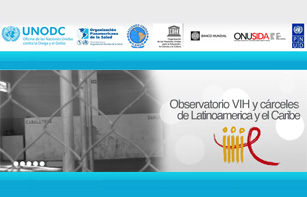
Observatorio VIH y Cárceles de LatinoaMÉrica y el Caribe
Mounting an effective challenge to HIV in prison settings is a key part of the AIDS response at national, regional and global levels. To define standards for HIV prevention and treatment and the protection and promotion of prisoners’ human rights, it is important to consolidate as much data as possible about the epidemic in this environment. The newly established Monitoring Centre for HIV and Prisons in Latin America and the Caribbean is set to become the key regional repository for such vital information.
The Monitoring Centre—called the Observatorio VIH y Cárceles de LatinoaMÉrica y el Caribe in Spanish—gathers data from 23 countries which is accessible via a web site. Its primary aim is to help governments and civil society define and implement national HIV prison policies based on international standards. Up and running in Spanish since mid-February, an English language version will be launched 30 April 2011.
The United Nations Office on Drugs and Crime (UNODC) is spearheading the initiative with support from the UN Educational, Scientific and Cultural Organisation (UNESCO), the Pan American Health Organization (PAHO), the World Bank, the UN Development Programme (UNDP) and UNAIDS.
According to José Vila del Castillo, UNODC Regional Advisor, “The Monitoring Centre shows the United Nations system ‘delivering as one’. Addressing HIV in the region’s prisons has become a priority. The centre is an important tool to catalyze prison reform processes and HIV penitentiary programmes.”
Addressing HIV in the region’s prisons has become a priority. The centre is an important tool to catalyze prison reform processes and HIV penitentiary programmes
José Vila del Castillo, UNODC Regional Advisor
Providing a permanent public space for informed reflection and dialogue, the virtual centre develops methodologies for collecting, processing, analysing and validating the scientific data gleaned on what works, and how best to proceed, in addressing HIV in prisons. It will highlight existing information and encourage ongoing research. Training and technical support are also offered through reference directories, online consultations, discussion forums and virtual classrooms.
In Latin America and the Caribbean, as elsewhere, many prisoners are vulnerable to HIV due to a number of factors, including the relative lack of knowledge about the virus among this population, overcrowding, lack of access to protection and good quality health services and violent conditions.
Across the region, where data are available, several countries have higher HIV prevalence in the prison population than in the general population. For example, according to data collected by UNODC this year, in Peru there are more than eight times as many people living with HIV in prison than outside (4.03% versus 0.4%). In Bolivia the situation is even starker; the same source documents show that in nine prisons in the country, 10% of prisoners are reported as HIV positive, compared to 0.2% prevalence in the wider society.
César Antonio Núñez, Director of UNAIDS’ Latin America Regional Support Team, believes the Monitoring Centre will provide a valuable insight into the lives of a neglected population, “The Centre will really help us to know the true HIV situation in the penitentiary system, and shed light on human rights-related issues. It is probably in the environment of HIV and prisons where UNAIDS’ commitment to being ‘the voice of the voiceless’ is most needed and appropriate.”

Feature Story
Students of Master’s degree in International Health begin new module on HIV at the Senghor University of Alexandria
19 April 2011
19 April 2011 19 April 2011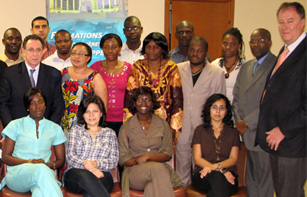
Twenty-two students from across sub-Saharan Africa, the Maghreb and Egypt took part in the five-day training which was launched on 17 April 2011. Credit: Senghor University of Alexandria
In 2010 UNAIDS and the Senghor University of Alexandria signed an agreement of cooperation to include a 25 hour module specific to AIDS into the university’s Master’s degree in International Health programme.
The opening session of this new module, co-organized by Senghor University and UNAIDS, was held on 17 April 2011. Twenty-two students from across sub-Saharan Africa, the Maghreb and Egypt took part in the five-day training.
In attendance at the course opening was Jean-Elie Malkin, special advisor to UNAIDS Executive Director, whom he represented on this occasion. He was joined by other senior UNAIDS staff including the Director of UNAIDS Regional Support Team for West and Central Africa Meskerem Grunitzky-Bekele; and Director of UNAIDS Regional Support Team for Middle East and North Africa, Hind Khatib-Othman. Dr Christian MÉsenge who is the Director of the Health Department at Senghor University of Alexandria represented the University’s President Albert Lourde.
External links
External links

Feature Story
UNAIDS Goodwill Ambassador HRH Crown Princess Mette-Marit of Norway calls to action during the Mali Youth Summit on HIV
19 April 2011
19 April 2011 19 April 2011
UNAIDS Goodwill Ambassador HRH Crown Princess Mette-Marit of Norway addressing young people at the Mali Youth Summit. 16 April 2011. Credit: UNAIDS\AFP H. KOUYATE
UNAIDS Goodwill Ambassador HRH Crown Princess Mette-Marit of Norway travelled to Bamako, Mali to participate in the Youth Summit on HIV, an event convened under the patronage of the President of the Republic of Mali, Amadou Toumani Touré, and co-hosted by UNAIDS.
HRH Crown Princess Mette-Marit of Norway addressed an audience of more than 150 young leaders at the youth summit. Speaking at a session on transformative social movements, the Crown Princess highlighted the opportunities offered by the social media tools to empower young people in new areas of advocacy.
“Young people must be mobilized to respond to deeply entrenched stigma and discrimination and a growing conservative backlash which threatens their access to sexual and reproductive health services, sexuality education, sexual expression, harm reduction and safety as human rights defenders,” said HRH Crown Princess Mette-Marit.
She encouraged young people to learn from different social movements to engage others in the AIDS response. The Crown Princess emphasized that it is the young who are sitting with the solutions and must have the opportunity to be heard.
Use your networks to create a momentum so that our leaders can't afford not to listen. Make them so powerful that world leaders cannot neglect them
UNAIDS Goodwill Ambassador HRH Crown Princess Mette-Marit of Norway
“My message to you is: When you experience lack of core funding, lack of data on young people, lack of personal rights or lack of access to treatment, use your courage, use your ideas and start your own social movements,” said the Crown Princess. “Use your networks to create a momentum so that our leaders can't afford not to listen. Make them so powerful that world leaders cannot neglect them.”
Joint visit to a neighbourhood clinic
Together with UNAIDS Executive Director Michel Sidibe UNAIDS Goodwill Ambassador HRH Crown Princess Mette-Marit visited a small clinic in one of Bamako's neighbourhoods that provides sexual and reproductive health as well as HIV services free of charge.
In less than 70 square meters, community members have access to information about HIV, training in the use of contraceptives and free HIV testing. The clinic also provides support for people living with HIV as well as HIV treatment.
External links
External links

Feature Story
Put girls first, speakers urge governments during Commission on Population and Development event
19 April 2011
19 April 2011 19 April 2011A version of this story was first published at unfpa.org

Dr Babatunde Osotimehin, Executive Director of UNFPA putting girls first during a side event at the 44th Session of the Commission on Population and Development. Credit: Antti Kaartinen/UNFPA
“Investing in adolescent girls benefits everyone, and when they flourish, their families and communities flourish as well. That’s why they are at the heart of our agenda.” This was the message of Dr Babatunde Osotimehin, Executive Director of UNFPA, speaking at the 44th Session of the Commission on Population and Development (CPD).
Dr Osotimehin addressed a side event called Putting Girls First during the CPD, which ran from 11-15 April at UN Headquarters in New York. It was attended by representatives of Member States, non-governmental organizations and experts participating in the CPD from around the world.
UNFPA’s Executive Director underlined the need to promote girls’ rights and gender equality and to prioritize them within national programmes for health, education, livelihoods and security. “Depending on the opportunities or choices girls have during adolescence, they can begin adulthood as empowered and active citizens, or they can be entrenched in poverty, neglected and voiceless,” Dr Osotimehin warned. “We must put girls first today to make a better tomorrow for everyone.”
Investing in adolescent girls benefits everyone, and when they flourish, their families and communities flourish as well.
Dr Babatunde Osotimehin, Executive Director of UNFPA
Another speaker, Dr. Gill Greer, Director-General of the International Planned Parenthood Federation (IPPF), said that “until girls are seen by their families and communities to have the same inherent worth as their brothers we cannot achieve resilient, sustainable social, economic and environmental development.”
She noted that, on a global level, girls still lag behind boys in secondary school attendance, saying that 70% of the 130 million out-of-school young people are girls and highlighted young women’s particular vulnerability to HIV. According to UNAIDS, young women account for more than two-thirds of new infections among young people worldwide.
Dr Greer added, “Today, it is time to put girls first so they can make the decisions that will drive development, and enable them to stand beside their brothers, partners, and husbands to hold up half the sky.”
External links
External links

Feature Story
Using games to prevent HIV among indigenous youth in Guatemala
18 April 2011
18 April 2011 18 April 2011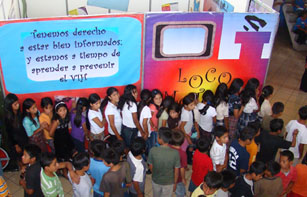
Children and adolescents from rural communities of Guatemala participating in the 5th Rolling Fair called More information, less infection.
More than 1000 indigenous children and adolescents aged 9 to 15 years old from rural communities of Guatemala learned about HIV in the 5th Rolling Fair called More information, less infection. The initiative, which took place in San Pedro Yepocapa, was organized by the non-governmental organization (NGO) Comunicares, with support from local authorities, the ministry of education, the municipality, public schools, and the children’s parents.
"Before I came to the fair I knew nothing about HIV. Now I have learned that HIV and AIDS are not the same thing, and also that we are very young for sex," said a 10 year old student looking to her friend as she tried to recall more information, "Ah! And that our body is only ours and no one can touch it.”
The event was part of a broader project “HIV prevention for vulnerable populations: rural, indigenous and sexually diverse” supported by UNAIDS with financial grants from the Kingdom of the Netherlands.
UNAIDS Project Coordinator Ms Pilar Marín highlighted that the project is a great opportunity to reach people, especially children and youth in the rural areas of Guatemala who have not had access to HIV information. "In Guatemala and specifically among the rural and indigenous populations, HIV is often perceived as a taboo. Through the project we are enhancing skills and knowledge to achieve a change in the behaviour of young people, to avoid risky practices," said Ms Marín.
Through the project we are enhancing skills and knowledge to achieve a change in the behaviour of young people, to avoid risky attitudes and practices
UNAIDS Project Coordinator Ms Pilar Marín
From 8 am until 6 pm students travelled through an educational and creative journey to learn about HIV. The Rolling Fair is an innovative initiative that consists of a train with 11 illustrative wagons. Each wagon provides information, entertainment and fun games related to themes such as modes of HIV transmission and ways to prevent HIV infection, sexual education, understanding of stigma and discrimination, as well as prevention of violence towards children, especially girls.
"The aim is that children learn through teenagers living in their own community and speak their own language. This fair also includes training for teachers and parents," remarked Oneida Rodas, Director of Comunicares.
The Dutch Ambassador Jan-Jaap van de Velde and UNAIDS Country Coordinator Enrique Zelaya also participated in the fair. They then traveled to San Juan Comalapa to take part in another event organized by the Association of Community Health Services (ASECSA). This initiative brought together 200 young students between 15 and 18 years of age from public institutions to participate in dynamic workshops and HIV awareness-raising talks as well as a play.
These activities have provided young people in this municipality with information about HIV prevention which is complementing the sexual and reproductive education received at school. According to government data, in 2009 only 23% of young people age 15 – 24 years old knew how to correctly identify ways of preventing sexual transmission of HIV and reject major misconceptions about HIV transmission.
Related

Feature Story
Guinea’s President and First Lady to attend the 2011 High Level Meeting on AIDS
15 April 2011
15 April 2011 15 April 2011
While touring the DREAM project in Conakry, UNAIDS Executive Director Michel Sidibé (centre) met an HIV-positive couple who gave birth to two HIV-negative babies. Photo credit: Mamadou Cellou Diallo/UNAIDS
President Alpha Condé and the First Lady, Ms Djene Kaba Condé, will participate in this year’s UN General Assembly High Level Meeting on AIDS. The announcement came during a two-day official visit by UNAIDS Executive Director Michel Sidibé to the West African nation of Guinea Conakry.
The High Level Meeting, from 8-10 June 2011, is widely seen as an important opportunity to revitalize the global AIDS movement and achieve the UNAIDS vision of zero new HIV infections, zero discrimination and zero AIDS-related deaths.
“I commend President Condé for his commitment and leadership on HIV,” said Mr Sidibé, after a meeting with Guinea’s Head of State on Thursday. “His presence at the High Level Meeting will be critical to advancing the AIDS response here in Guinea, and globally,” he added.
Over the past decade, Guinea has made significant strides in its national response to HIV. Between 2001 and 2009, Guinea saw a 25% reduction in its rate of new HIV infections. Coverage of antiretroviral treatment in the country reached 40% in 2009, up from just 3% in 2004. Furthermore, HIV prevalence in Guinea has remained relatively low since 2006, at about 1% of the adult population.
In his discussions with President Condé, the UNAIDS Executive Director underscored the importance of shared responsibility around AIDS funding. “Ninety six per cent of the AIDS treatment in Guinea is currently funded through external sources. This situation is unsustainable,” said Mr Sidibé, adding that both domestic and international AIDS investments must increase. President Condé committed in his meeting with Mr Sidibé to creating a national fund for the purchase of antiretroviral drugs and said that his government would maintain current HIV investments.
UNAIDS announces US $60 000 grant to a foundation run by the First Lady
I commend President Condé for his commitment and leadership on HIV. His presence at the High Level Meeting will be critical to advancing the AIDS response here in Guinea, and globally
UNAIDS Executive Director Michel Sidibé
In a meeting on Thursday with the First Lady of Guinea, Mr Sidibé said that vertical transmission of HIV was a pressing concern for UNAIDS in Guinea. In 2009, only 17% of pregnant women living with HIV in Guinea were able to access services to prevent new HIV infections among children. That same year, just 10% of pregnant women were tested for HIV.
During the meeting, Mr Sidibé said that UNAIDS, with funds received from Cooperation française, would grant US $60 000 to a national foundation created by the First Lady focused on maternal and child health. The grant is earmarked specifically for stopping new HIV infections among children in Guinea.
Preventing vertical transmission of HIV in Conakry
Earlier in the day, Mr Sidibé visited a project in Conakry, the capital city of Guinea, that provides mothers with a complete package of services to prevent new HIV infections among children. Established in 2002, the DREAM project offers HIV prevention and treatment services as well as psychosocial and nutritional support, advanced laboratory analysis, and health education. All services are provided free of charge.
The DREAM project, supported by the Community of St Egidio (a religious association), UNICEF and UNAIDS, has two centres in Conakry and operates a mobile clinic that brings health services directly to women in the region. With support from UNAIDS, a third centre will soon be opened in Dubreka, 50 kilometres from Conakry.
Since 2006, more than 3600 people living with HIV have received antiretroviral treatment at the two centres. More than 800 mothers enrolled in the programme have given birth to HIV-negative babies.
While touring the DREAM project, Mr Sidibé met Fatoumata Sylla and Naby Bangoura, an HIV-positive couple who gave birth to two HIV-negative babies. Fatoumata received antiretroviral prophylaxis during her pregnancy; she now works at the DREAM programme and shares her experience with other women. Fatoumata told Mr Sidibé that while many women continue to receive free services through the DREAM project, some are turned away as the centre does not have sufficient funding to meet patient demand.
The DREAM project, headquartered in Italy, is working in nine other countries across Africa, including Mozambique, Malawi, Tanzania, Kenya, Guinea Bissau, Cameroon, Democratic Republic of Congo, Angola and Nigeria.



